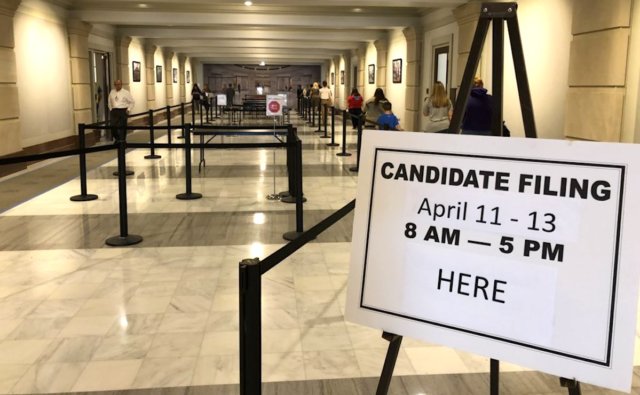

Today, candidates for Oklahoma’s 2018 election cycle will begin filing for office. Anyone who wants to run for office in Oklahoma will need to file paperwork at the State Capitol from 8 a.m. to 5 p.m. today through Friday.
All U.S. representative seats are up for election, as are nine of Oklahoma’s statewide positions, all Oklahoma House seats and half of Oklahoma Senate districts (those with even numbers).
Primary elections will be held Tuesday, June 26. In the event of a runoff, those elections will be held Tuesday, Aug. 28. The general elections will take place Tuesday, Nov. 6.
The state’s filing packet is embedded as a PDF at the bottom of this article.
U.S. Representative qualifications
The qualifications for representing Oklahoma in U.S. House are pretty straightforward. According to the U.S. Constitution, Article I, Section 2:
No Person shall be a Representative who shall not have attained to the Age of twenty five Years, and been seven Years a Citizen of the United States, and who shall not, when elected, be an Inhabitant of that State in which he shall be chosen.
In plain English: Be at least 25 years old, have at least seven years of U.S. citizenship and live in the state for which you seek the office of U.S. representative.
State officer qualifications
The Oklahoma Constitution’s Article 6, Section 3 outlines the requirements for prospective candidates seeking the positions of:
- governor
- state treasurer
- lieutenant governor
- superintendent of public instruction
- or attorney general.
Similar to the U.S. rep’ requirements, candidates must be at least 31 years old and a “qualified elector” (i.e., registered voter) for 10 years prior to the election.
Further, according to Oklahoma Statute, Title 26, Section 5-105 and 5-105a, candidates filing as a member of a political party or as an independent “… must have been a registered voter of that party for the six-month period immediately preceding the first day of the filing period …”.
If you have pleaded guilty or no contest to a misdemeanor involving embezzlement or any felony, then you’ll have to wait 15 years from the completion of your sentence to run for these offices. Those receiving pardons are freed of this restriction.
Last, state law prohibits anyone from seeking office “who adopts or has adopted the name of any person of state or national reputation, living or dead.” (Decades ago, it was not uncommon to see Oklahoma ballots littered with candidates named Will Rogers.)
State senate qualifications
Prospective state senators must be at least 25 years old and reside in the county or district they represent during their term in office and be registered to vote there for six months prior to the first filing day. Those currently serving as U.S. or state officials as well as those convicted of felonies are barred from seeking a senate seat.
State representative qualifications
Prospective state reps’ need only be 21 or older. Otherwise, the same stipulations and restrictions outlined for Senate seats apply.
Qualifications for other offices
The qualifications for state auditor and inspector as stated in Article 6, Section 19 include the same requirements as the state positions above but also stipulate that candidates must have been “expert accountants” (natch) for at least three years prior to seeking office.
The requirements for insurance commissioner also include the same stipulations as state officers except that candidates may be as young as 25 years old “… and well versed in insurance matters” with at least five years’ of industry experience. Further, according to statute:
The Insurance Commissioner shall not be financially interested, directly or indirectly, in any insurer, agency or insurance transaction except as a policyholder or claimant under a policy.
In addition to the general requirements for state officers, corporation commissioner candidates must be at least 30 years old and Oklahoma residents for two years. Additionally, no candidate shall be:
… directly or indirectly, interested in any railroad, street railway, traction line, canal, steam boat, pipe line, car line, sleeping car line, car association, express line, telephone or telegraph line, operated for hire, in this State, or out of it, or any stock, bond, mortgage, security, or earnings of any such railroad, street railway, traction line, canal, steam boat, pipe line, car line, sleeping car line, car association, express line, telephone or telegraph line, compress or elevator companies …
To do so after becoming elected or to hold any other office in Oklahoma or elsewhere would require the office holder to vacate their position.
Last, other than being a registered voter for six months prior to the filing date and adhering to the criminal conviction guidelines, requirements for labor commissioner are relatively lax, with no specific professional experience or minimum age stated in statute or State Constitution.
District attorney qualifications
A minimum age of 28, two years of state residency and six months’ worth of being a registered voter in the district sought are the basic requirements outlined. More specifically, candidates must have at least five years of experienced as a licensed attorney.
Qualifications for district and associate district judge
Beyond the standard requirement of voter registration prior to seeking office, candidates for district judge positions need a minimum of four years’ experience as a either a licensed attorney, judge or both. Meanwhile, candidates for associate district judge need only two years of experience as a licensed attorney, judge or both in Oklahoma. If no one files for an office that would otherwise become vacant, the seat would be filled via appointment. In that case, residency and durational requirements can be bypassed. Also:
No one who has been removed from judicial office or who has resigned from office pending disciplinary proceedings shall qualify to file as a candidate for judicial office.
Last, because these positions are intended to be nonpartisan, ballots will omit candidates’ political affiliations.
